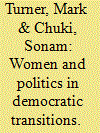|
|
|
Sort Order |
|
|
|
Items / Page
|
|
|
|
|
|
|
| Srl | Item |
| 1 |
ID:
161405


|
|
|
|
|
| Summary/Abstract |
This article deals with the scandals that engulfed South Korea’s president, Park Geun-hye, in 2016–17 and the role of popular protest in how she, her confidante, and associated officials and business leaders were pursued, prosecuted, and jailed. The South Korean experience is located in a framework of integrity institutions and the 1986 exemplar of “people power” in the Philippines.
|
|
|
|
|
|
|
|
|
|
|
|
|
|
|
|
| 2 |
ID:
153573


|
|
|
|
|
| Summary/Abstract |
THE REFORM OF STATE-OWNED ENTERPRISES (SOES) HAS BEEN A
leading element of public sector reform since the 1980s. Starting
with the radical actions of Margaret Thatcher’s government in
the United Kingdom, privatization was disseminated across the
world. By 2004, over $1 trillion of SOEs had been privatized.
The privatization stampede represented the ascendancy of neoclassical
economics and the view that governments should get
out of business and leave the invisible hand of the market to
either generate efficiency in often poorly performing enterprises
or simply close them down (World Bank 1995, 1996, 1997).
This neoliberal policy orientation dovetailed with the Washington
Consensus and the spread of New Public Management, both
of which sought leaner, more fiscally disciplined government
that focused on core functions (Turner, Hulme, and McCourt
2015).
|
|
|
|
|
|
|
|
|
|
|
|
|
|
|
|
| 3 |
ID:
153576


|
|
|
|
|
| Summary/Abstract |
In this article we trace the history of state-owned enterprise (SOE) reform in Laos. Commencing in 1986, SOE reform was a component of the New Economic Mechanism (NEM), a program of changes that moved the economy toward one based on market principles. SOE reform is located within the broader reforms associated with the NEM and is divided into three distinct phases. We present and analyze a case study of the reform of the national electricity company (Électricité du Laos) in terms of a stages model of power sector reform. The overall findings show the importance of context in influencing the specific nature of SOE reform.
|
|
|
|
|
|
|
|
|
|
|
|
|
|
|
|
| 4 |
ID:
155744


|
|
|
|
|
| Summary/Abstract |
This article addresses the question of what happens to women in democratic transitions. Of particular concern is whether women are encouraged to participate in politics and to stand as candidates for seats in national legislatures. In many instances, women have made only marginal progress in seeking election and getting elected in newly democratized regimes. This situation has been the experience of Bhutan, a country that held its first national elections only in 2007–2008. Despite women making significant gains in areas such as education, health and employment in Bhutan and guarantees of gender equality in the Constitution, they have made a poor showing in electoral politics. The article uses the explanatory framework of patriarchy to explore women’s minor participation in electoral politics. Of special concern are deeply rooted traditional concepts that have been employed today to exclude women from competing for and winning political office. The article concludes that because patriarchal attitudes are so deeply embedded only incremental progress will be made under current electoral rules. Alternatively, there could be quota systems as in some other South Asian countries.
|
|
|
|
|
|
|
|
|
|
|
|
|
|
|
|
|
|
|
|
|